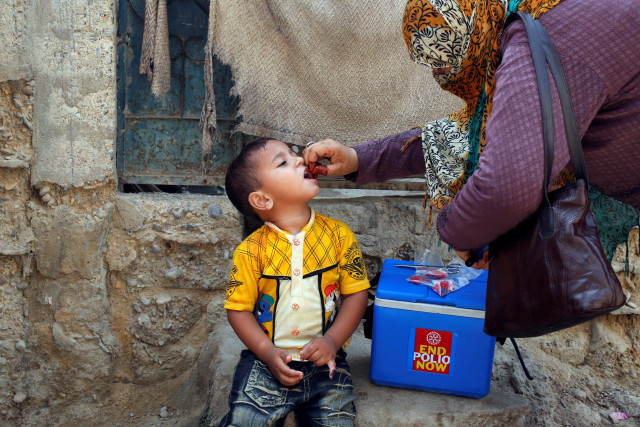Fight against polio
There's an urgent need to work against superstition & mistrust among the general public against anti-polio vaccination

PHOTO: REUTERS
Possibly a toxic campaign carried out on social media by misguided elements has impacted the battle against the disease. There is also mistrust among the general public — particularly in the tribal areas of the country — against anti-polio vaccination. Anti-national elements have long been carrying out a sustained campaign against the Expanded Programme of Immunisation. It is a measure of insensitivity to children’s health that recently some traders — belonging to district Bannu of K-P — had threatened to boycott the upcoming immunisation campaign unless sales tax was withdrawn. The government has warned such elements that attempt to obstruct immunisation drives will not be tolerated.
At a high-level meeting presided over by the Prime Minister in Islamabad on August 21, important decisions were taken to intensify the polio immunisation campaign. The meeting was told that to avoid vaccination, parents themselves marked the fingers of their children. On the occasion, an official asked the prime minister to issue an executive order that DCs should not register an FIR in case of refusal by parents because it further increases refusals.
Polio is a viral disease and it spreads due to unsanitary conditions. There is no cure for the disease, but it is preventable. The state of sanitation in different parts of the country is, however, highly unsatisfactory. Moreover, there is an urgent need to work against superstition. It assumes an added significance in a country where more people stop when they see cats crossing their path than those who stop at traffic signals.
Published in The Express Tribune, August 24th, 2019.
Like Opinion & Editorial on Facebook, follow @ETOpEd on Twitter to receive all updates on all our daily pieces.







1724319076-0/Untitled-design-(5)1724319076-0-208x130.webp)






COMMENTS
Comments are moderated and generally will be posted if they are on-topic and not abusive.
For more information, please see our Comments FAQ